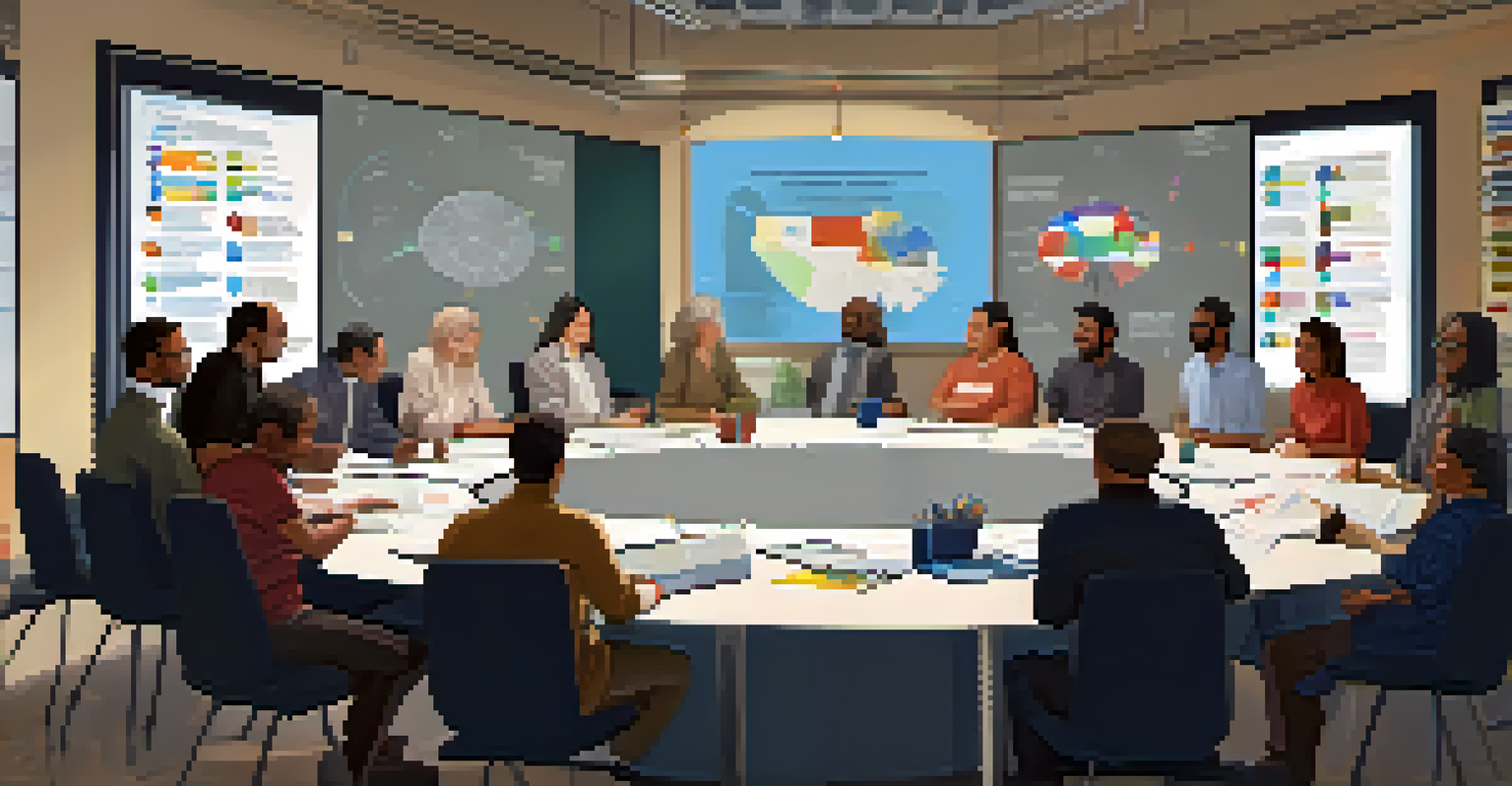How Decentralization Shapes Community Governance in DAOs

Understanding Decentralization and DAOs
Decentralization refers to distributing power away from a central authority, allowing communities to make decisions collectively. In the context of Decentralized Autonomous Organizations (DAOs), this means that governance is not controlled by a single entity but rather by its members. DAOs operate on blockchain technology, ensuring transparency and security in decision-making processes.
Decentralization is the future of governance, allowing communities to self-organize and collaborate in ways that were previously unimaginable.
Imagine a community garden where everyone has a say in what to plant and how to maintain it, rather than one person dictating all choices. This analogy highlights how DAOs empower all participants to contribute ideas and vote on proposals. As a result, members feel more invested and engaged in the community's outcomes.
Thus, understanding the foundational concepts of decentralization and DAOs is crucial to grasp how they reshape governance structures. These unique organizations promote inclusivity and ownership, laying the groundwork for a more democratic approach to decision-making.
The Role of Smart Contracts in Governance
Smart contracts are self-executing contracts with the terms of the agreement directly written into code. In DAOs, these contracts automate governance processes, ensuring that decisions are executed fairly and transparently. For instance, when a majority votes on a proposal, the smart contract automatically implements the agreed-upon actions without human intervention.

Think of smart contracts as the rules of a game that everyone agrees to follow. They eliminate ambiguity and reduce the potential for disputes, as all members can see the same information. This trust in automated processes fosters a sense of security among participants.
Decentralization Empowers Communities
Decentralization allows communities to collectively make decisions, enhancing engagement and ownership among members.
By relying on smart contracts, DAOs can streamline operations and focus on community engagement rather than bureaucratic delays. This technology enhances the effectiveness of decentralized governance and reinforces the principles of transparency and fairness.
Community Engagement and Decision-Making
Engagement is the lifeblood of any successful DAO; without active participation, governance can stagnate. DAOs typically employ voting mechanisms where members can propose and vote on initiatives, ensuring everyone has a voice. This encourages a sense of ownership and responsibility among participants.
Transparency is the key to trust in decentralized systems; when everyone can see the rules and their enforcement, accountability naturally follows.
Picture a town hall meeting where every resident can suggest improvements or voice concerns. This collaborative approach not only strengthens community bonds but also leads to more thoughtful and diverse decision-making. The more people engage, the richer the collective intelligence becomes.
Ultimately, fostering community engagement is vital for the growth and sustainability of a DAO. When members feel their contributions matter, they are more likely to invest time and energy into the community's success.
Challenges of Decentralized Governance
While decentralization offers numerous benefits, it also presents unique challenges. One significant issue is the potential for low participation rates in decision-making, which can lead to a few individuals dominating discussions. This phenomenon, often called 'voter apathy,' can undermine the very principles of a DAO.
Imagine a vibrant community where only a handful of voices are heard, drowning out the majority. This scenario highlights the importance of encouraging participation and ensuring that all voices are valued. Strategies such as incentives for voting or simplified voting processes can help mitigate this challenge.
Smart Contracts Ensure Fairness
Smart contracts automate governance processes in DAOs, ensuring decisions are executed transparently without human bias.
Addressing these challenges is crucial for the long-term viability of DAOs. By creating an inclusive environment that motivates participation, communities can thrive and maintain the essence of decentralized governance.
Transparency and Accountability in DAOs
One of the core principles of decentralization is transparency, which is crucial for building trust within a DAO. All transactions and decisions are recorded on the blockchain, allowing members to audit and verify actions taken by the organization. This transparency fosters an environment of accountability where members can hold each other responsible.
Think of a transparent glass house where everyone can see what's happening inside. This metaphor illustrates how transparency in DAOs allows for oversight and discourages misconduct. When members know their actions are visible, they are more likely to act responsibly.
Incorporating transparency and accountability into governance processes strengthens community bonds and encourages ethical behavior. This trust is essential for the long-term success of any DAO.
The Influence of Tokenomics on Governance
Tokenomics, or the economic structure of tokens within a DAO, plays a pivotal role in influencing governance dynamics. Tokens often represent voting power, meaning those with more tokens can sway decisions significantly. This can lead to potential imbalances if not carefully managed, as wealthy participants may dominate governance.
Consider a situation where a few individuals hold the majority of tokens, effectively controlling the DAO's direction. This analogy underscores the importance of designing a fair token distribution model that encourages participation from all members. Equitable tokenomics can mitigate power imbalances and promote a more democratic governance structure.
Participation is Crucial for DAOs
Active community engagement is essential for a DAO's success, as it fosters diverse decision-making and strengthens bonds among members.
Therefore, understanding and addressing tokenomics is essential for maintaining a balanced and inclusive governance system. By fostering equitable participation, DAOs can better align with their decentralization goals.
Future Trends in DAO Governance
As DAOs continue to evolve, so too will the methods of governance they adopt. Emerging trends include the integration of artificial intelligence (AI) to assist with decision-making processes, providing insights based on data analysis. This could enhance the speed and efficiency of governance while still prioritizing community input.
Imagine having an intelligent assistant that helps you sift through complex data to make informed decisions. This technology could empower DAO members to make choices backed by solid evidence, while still relying on their collective wisdom. The future of DAO governance appears promising as technology and community collaboration converge.

In conclusion, the future of DAO governance will likely be characterized by innovative solutions that enhance participation and transparency. Staying ahead of these trends will be essential for communities aiming to maximize the benefits of decentralization.